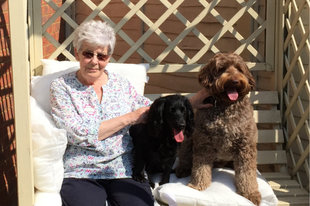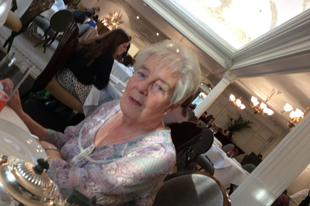Linsey: “My wonderful Mum could still be alive today - if only the GP had done two simple things”

Anne
Linsey’s Mum, Anne, was diagnosed with stage 4 cancer in 2011, aged 77. Despite visiting her GP about her symptoms, she was repeatedly misdiagnosed.
Linsey candidly talks about her Mum’s story and highlights the unfairness she experienced. Linsey shares her plea to women experiencing any of the symptoms of ovarian cancer.
“Anne, my wonderful mum, was generally fit and healthy but was experiencing symptoms. But she was off her food which was very unusual for her, and she was feeling bloated and tired. Her first visit to the GP was swift and elicited a verdict of either a virus or possible Irritable Bowel Syndrome (IBS).
Fast forward to another couple of appointments, IBS medication and equally swift in and outs at the surgery and my sister and I could see that mum was moving in the wrong direction. Her symptoms became more persistent - she was losing weight, increasingly tired and had a visibly bloated tummy.
I was so worried that I decided to pay for a consultation with a gastroenterologist, Dr David Gertner. This was the best £250 I have ever spent. Within minutes of mum lying down on the bed, he put a stethoscope to her tummy - which wasn’t something the GP had ever done.
He then said, “I want you at the hospital tomorrow morning, just ask for me. You don’t need an appointment, I’ll sort it.” He didn’t offer up a diagnosis at that stage, but he referenced ascites - an abnormal build-up of fluid in the abdomen.
I was googling until midnight. I put two and two together. The next day, an enormous seven litres of fluid were drained from mum. The not-quite-yet-definitive diagnosis was here. Ovarian cancer.
Mum was so shocked by her diagnosis. She turned to Dr Gertner and said, “There was a poster in the GP surgery about the symptoms of ovarian cancer. I said to the doctor, I have all of those. Could I have ovarian cancer? He laughed, and said no”.
Mum was given a CA125 blood test and her result was a whopping 1,500 units per millimetre. We thought it might be in double digits, but the results were so much higher than we expected.

Photo of Anne
Five years on after her stage 4 diagnosis and the CA125 blood test, I could write a book about the ups, the downs, the learnings, the amazing treatment, the frustrations and the joy and sadness.
Mum was lucky that her cancer initially hated her chemotherapy regime. Her CA125 blood test results went down to seven - from 1,500 the first time. She had a full hysterectomy, regular follow up appointments and ultimately more rounds of chemo.
When she was up against it, the NHS was amazing.
She was able to enjoy her 80th birthday a few years later with a trip to Buckingham Palace and afternoon tea courtesy of Harrods where she worked until she retired.
But tragically, the cancer came back twice. The second time around, it was too aggressive for the treatment. It was too much for her increasingly frail body to take.
“GPs are so stretched - but if only they’d had the knowledge to perform the CA125 blood test and an examination of her tummy, she could still be here”
The ‘what ifs’ and ‘if onlys’ are many. If only we’d pushed for a blood test. But we didn’t know that existed. If we’d known to get the doctor to listen to her tummy. But we didn’t know that either. If we’d had any type of knowledge about ovarian cancer. We had none.
Those two simple things if done early by the GP would have meant mum would have entered her cancer journey at an earlier stage and with a better prognosis. If only GP’s had more time to spend on each patient, rather than producing a quick diagnosis without a full examination. She could have still been alive today.
“Please don’t be afraid to push your doctor and ask for a second opinion”
To anyone out there reading this, If you have any of the symptoms, but are thinking, no, it’s just a tummy issue - please look your doctors straight in the eye and ask them to check you for ovarian cancer. Ask for a CA125 blood test and get them to listen to your tummy.
If you’re able to come out of the NHS system with a private consultation to get that specialist care, please just do it. The doctor you’ll see will most likely work at your local hospital. In mum’s case, she had no private healthcare. Dr Gertner knew this and helped us get moving fast once we’d seen him. We were lucky.
He started the process of giving us five precious years with mum. For that, I am eternally grateful.”

Anne out for lunch
Persistent bloating, persistent stomach pain, needing to wee more frequently and difficulty eating are the key symptoms of ovarian cancer – but are commonly linked to other, less serious illnesses.
We’re empowering women and health professionals about the symptoms of ovarian cancer to diagnose ovarian cancer in others as early as possible. We’re determined to make sure no-one dies of ovarian cancer.